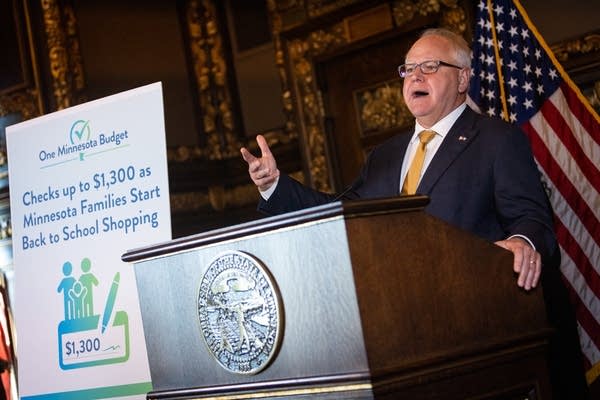Former Gov. Carlson: DFL spending is ‘inviting catastrophe’

Go Deeper.
Create an account or log in to save stories.
Like this?
Thanks for liking this story! We have added it to a list of your favorite stories.
The latest state budget forecast comes out Wednesday and DFL leaders are already warning caucus members it won’t afford much new spending, after the last forecast foreshadowed financial headwinds.
A person who knows his way around the state budget — former Gov. Arne Carlson — calls DFL leaders’ decision to spend much of the state’s $18 billion surplus last session reckless financial planning.
“When you spin out a program today, you have to assume that the cost of that program will expand. And when you have $17 billion in money — some of it one time money, some of it outgoing — you’re inviting a catastrophe down the line if you don’t do five-year planning,” the Republican-turned-independent said on Morning Edition on Friday. “I’d like to see the state get back to long term planning.”
In a statement, Gov. Tim Walz said, “We value former Governor Carlson’s opinion, though his frequent public statements about our office often leap from valid concerns to significant misinformation, a distinction we have shared with him repeatedly. The current Administration engages with him on a wide variety of issues and will continue to do so, though in some cases we fundamentally disagree.”
Turn Up Your Support
MPR News helps you turn down the noise and build shared understanding. Turn up your support for this public resource and keep trusted journalism accessible to all.
Listen to the full conversation with Carlson using the audio player above or read a transcript of it below. Both have been edited for clarity and length.
When you were in office, you inherited a $2 billion state budget deficit. When you left, there was a surplus. What did you learn during your tenure that was maybe better than what's going on right now?
We insisted on going out at least three years and then expanded that to five. But also, I would like to see Minnesota put much more money in reserves for unforeseen contingencies that will occur.
The state currently has $3 billion in reserve right now. That’s not enough.
It depends on the size of the budget and what the long term picture looks like. With all the zigs and zags in the stock market and the disruptions on the global scene, I’m not sure that it’s enough.
DFLers say they are investing in the state. If you think they’ve gone too far to the left, shouldn't Republicans possibly come into the middle where many voters are?
Look, as long as you have four caucuses that have become massive, massive political operations, they’re in the business of war. They’re not in the business of developing good, sound long-term public policy. That’s a reality. And that’s something we really have to focus a lot more attention on.
You recently said you regret endorsing Gov. Walz. It is unusual for a former governor to be as outspoken in his displeasure with a current leader as you were. What’s your main issue with Gov. Walz?
Well, I think a governor is in charge of protecting the highest standards of integrity in government. And as I’ve been writing about now for six years, both political parties have been in the business of raising inordinate sums of money from special interests.
Is some of your displeasure also linked to copper-nickel mining in northeastern Minnesota?
Absolutely. Our water is in peril in Minnesota. In 2019, I think 50 percent of our waters were declared to be impaired. That number is rapidly growing. And then you've got the enormous power of the mining industry over the legislature and the governor.
It sounds as though you’ve attempted to talk to the governor about this.
Oh, heavens, yes. I kept contacting the governor and got stonewalled entirely. Finally, a phone call was set up I had to make an appointment for a phone call. And then right before the phone call, it was cancelled because the government was too busy. That’s unbelievable. But I don’t want to make this personal because it’s not personal. It’s entirely on public policy.
Why is it important for you, at age 88, to keep up the letter writing, to keep up the public stances against mining, to keep politically active?
I’m so glad you asked that question. I really am. First of all, I’m 89. I'm going into my 90th year. It’s just, oh gosh, it's frightening. But having said that, I remember having lunch with Harold Stassen, and I asked him that question.
And he gave an answer I never forgot. He said, “Look, people retire and they go to Florida and they fish and everybody says, ‘Isn’t that wonderful?’ People retire and they go to Arizona and they play a lot of golf and everybody says, ‘Isn't that wonderful? What a nice way to retire.’”
He said, “I don't want to retire to that. I want to retire into something I love. I love the ideas and the involvement of politics.”
And when I retire, I don’t retire into a void, if you will, of not participating in governmental affairs. If I can have an active voice, I’m going to have an active voice. I want to participate until I die.


